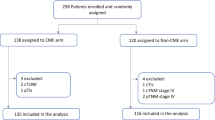Abstract
Pelvic exenteration is potentially curative for operable locally advanced primary and locally recurrent rectal cancers. R0 resection is associated with higher survival. This procedure is associated with low mortality rates but high postoperative morbidity proportional to the extent of resection. This study was done to find out the survival outcome and morbidity associated with this procedure and to determine prognostic factors associated with postoperative outcomes. Seventy-three patients with rectal cancer underwent pelvic exenteration between January 2009 and December 2020. Sixty-six patients had locally advanced rectal cancer and 7 patients had recurrent cancer. All patients with primary tumors were evaluated with MRI pelvis and CT scan of the chest and abdomen while patients with recurrence were evaluated with a PET scan. The median follow-up duration was 39 months. The majority of patients were in the age group 40–69 years. Thirty patients were males and 43 were females. The 30-day postoperative major morbidity was reported in 28 patients (38.4%). The most common morbidity was wound dehiscence. The mean overall survival (OS) was 110.6 months (95% CI, 97.5–123.7) and mean disease free survival (DFS) was 85 months (95% CI, 71.0–100.4). R0 resection was associated with favorable overall survival. Tailored exenterations were associated with low morbidity. En bloc partial sacrectomy helped achieve R0 resection in patients who underwent the procedure. Extended resections yielded high R0 resection rates with favorable survival (65 months) but were associated with high morbidity. These procedures shall be best practiced in high-volume institutes of expertise.




Similar content being viewed by others
References
Yang TX, Morris DL, Chua TC (2013) Pelvic exenteration for rectal cancer: a systematic review. Dis Colon Rectum 56(4):519–531
Xin KY, Ng DWJ, Tan GHC, Teo MCC (2014) Role of pelvic exenteration in the management of locally advanced primary and recurrent rectal cancer. J Gastrointest Cancer 45(3):291–297
Collaborative PelvEx (2019) Surgical and survival outcomes following pelvic exenteration for locally advanced primary rectal cancer: results from an international collaboration. Ann Surg 269(2):315–321
Sasikumar A, Bhan C, Jenkins JT, Antoniou A, Murphy J (2017) Systematic review of pelvic exenteration with en bloc sacrectomy for recurrent rectal adenocarcinoma: R0 resection predicts disease-free survival. Dis Colon Rectum 60(3):346–352
Bhangu A, Ali SM, Brown G, Nicholls RJ, Tekkis P (2014) Indications and outcome of pelvic exenteration for locally advanced primary and recurrent rectal cancer. Ann Surg 259(2):315–322
Gezen C, Kement M, Altuntas YE, Okkabaz N, Seker M, Vural S et al (2012) Results after multivisceral resections of locally advanced colorectal cancers: an analysis on clinical and pathological t4 tumors. World J Surg Oncol 10(1):39
Kumar NA, Sasi SP, Shinde RS, Verma K, Sugoor P, Desouza A, Engineer R, Saklani A (2020) Minimally Invasive Surgery for Pelvic Exenteration in Primary Colorectal Cancer. JSLS 24(3):e2020.00026. https://doi.org/10.4293/JSLS.2020.00026
Carballo L, Enríquez-Navascués JM, Saralegui Y, Placer C, Timoteo A, Borda N et al (2015) Total pelvic exenteration for the treatment of advanced primary or recurrent pelvic neoplasia. Cir Esp (Engl Ed) 93(3):174–180
Barbaro B, Vitale R, Leccisotti L, Vecchio FM, Santoro L, Valentini V et al (2010) Restaging locally advanced rectal cancer with MR imaging after chemoradiation therapy. Radiographics 30(3):699–716
Bahadoer RR, Dijkstra EA, van Etten B, Marijnen CAM, Putter H et al (2021) Short-course radiotherapy followed by chemotherapy before total mesorectal excision (TME) versus preoperative chemoradiotherapy, TME, and optional adjuvant chemotherapy in locally advanced rectal cancer (RAPIDO): a randomised, open-label, phase 3 trial. Lancet Oncol. 22(1):29–42. https://doi.org/10.1016/S1470-2045(20)30555-6
Clavien PA, Barkun J, de Oliveira ML, Vauthey JN, Dindo D, Schulick RD et al (2009) The Clavien-Dindo classification of surgical complications: five-year experience. Ann Surg 250(2):187–196
Grimes WR, Stratton M (2022) Pelvic exenteration. StatPearls Publishing
Kim J (2012) Pelvic exenteration: surgical approaches. J Korean Soc Coloproctol. 28(6):286–93. https://doi.org/10.3393/jksc.2012.28.6.286
Lampe B, Luengas-Würzinger V, Weitz J, Roth S, Rawert F, Schuler E et al (2021) Opportunities and limitations of pelvic exenteration surgery. Cancers (Basel) 13(24):6162
Fahy MR, Hayes C, Kelly ME, Winter DC (2022) Updated systematic review of the approach to pelvic exenteration for locally advanced primary rectal cancer. Eur J Surg Oncol 48(11):2284–2291
Nielsen CKP, Sørensen MM, Christensen HK, Funder JA (2022) Complications and survival after total pelvic exenteration. Eur J Surg Oncol 48(6):1362–7
Collaborative The PelvEx, Kelly ME, Glynn R, Aalbers AGJ, Abraham-Nordling M, Alberda W et al (2018) Factors affecting outcomes following pelvic exenteration for locally recurrent rectal cancer: factors affecting outcomes following pelvic exenteration for locally recurrent rectal cancer. Br J Surg 105(6):650–7
Bogner A, Fritzmann J, Müssle B, Huber J, Dobroschke J, Bork U et al (2021) Pelvic exenteration for colorectal and non-colorectal cancer: a comparison of perioperative and oncological outcome. Int J Colorectal Dis 36(8):1701–1710
Author information
Authors and Affiliations
Corresponding author
Ethics declarations
Ethics Approval
Approved.
Conflict of Interest
The authors declare no competing interests.
Additional information
Publisher's Note
Springer Nature remains neutral with regard to jurisdictional claims in published maps and institutional affiliations.
Supplementary Information
Below is the link to the electronic supplementary material.
Rights and permissions
Springer Nature or its licensor (e.g. a society or other partner) holds exclusive rights to this article under a publishing agreement with the author(s) or other rightsholder(s); author self-archiving of the accepted manuscript version of this article is solely governed by the terms of such publishing agreement and applicable law.
About this article
Cite this article
S, V., Pareekutty, N.M. & Balasubramanian, S. Outcomes Following Treatment of Pelvic Exenteration for Rectal Cancer in a Tertiary Care Center. Indian J Surg Oncol 15, 420–427 (2024). https://doi.org/10.1007/s13193-024-01918-w
Received:
Accepted:
Published:
Issue Date:
DOI: https://doi.org/10.1007/s13193-024-01918-w




